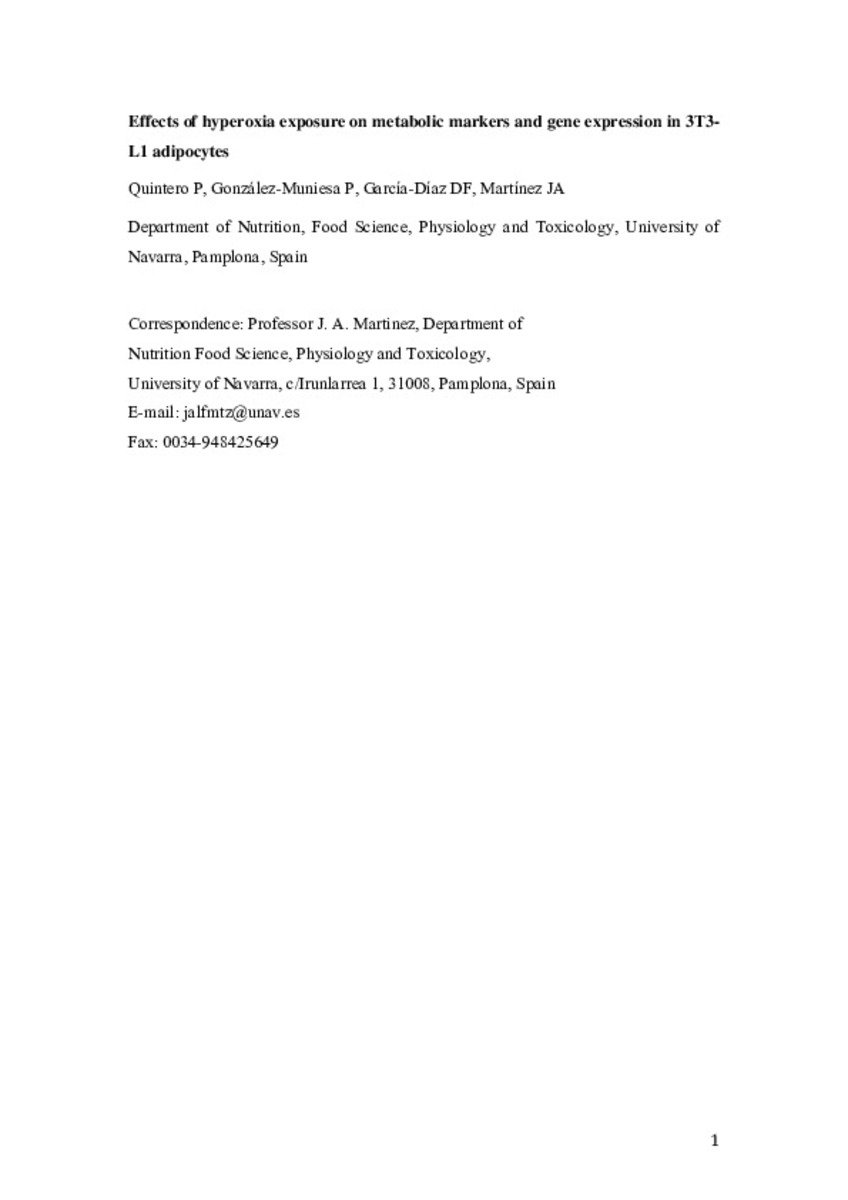Full metadata record
| DC Field | Value | Language |
|---|---|---|
| dc.creator | Quintero, P. (Pablo) | - |
| dc.creator | Gonzalez-Muniesa, P. (Pedro) | - |
| dc.creator | Garcia-Diaz, D.F. (Diego F.) | - |
| dc.creator | Martinez, J.A. (José Alfredo) | - |
| dc.date.accessioned | 2014-11-20T11:22:38Z | - |
| dc.date.available | 2014-11-20T11:22:38Z | - |
| dc.date.issued | 2012 | - |
| dc.identifier.citation | Quintero P, González-Muniesa P, García-Díaz DF, Martínez JA. Effects of hyperoxia exposure on metabolic markers and gene expression in 3T3- L1 adipocytes. J Physiol Biochem. 2012 Dec;68(4):663-669 | es_ES |
| dc.identifier.issn | 1138-7548 | - |
| dc.identifier.uri | https://hdl.handle.net/10171/37067 | - |
| dc.description.abstract | Adipose tissue often becomes poorly oxygenated in obese subjects. This feature may provide cellular mechanisms involving chronic inflammation processes such as the release of proinflammatory cytokines and macrophage infiltration. In this context, the purpose of the present study was to determine whether a hyperoxia exposure on mature adipocytes may influence the expression of some adipokines and involve favorable changes in specific metabolic variables. 3T3-L1 adipocytes (14 days differentiated) were treated with 95% oxygen for 24 h. Cell viability, intra and extracellular reactive oxygen especies (ROS) content, glucose uptake and lactate and glycerol concentrations were measured in the culture media. Also, mRNA levels of HIF-1[alfa], leptin, IL-6, MCP-1, PPAR-[gamma], adiponectin, and ANGPTL-4 were analyzed. Hyperoxia treatment increased intra and extracellular ROS content, reduced glucose uptake and lactate release and increased glucose release. It also led to an upregulation of the expression of IL-6, MCP-1 and PPAR-[gamma], while ANGPTL4 was downregulated in the hyperoxia group with respect to control. The present data shows that hyperoxia treatment seems to provoke an inflammatory response due to the release of ROS and the upregulation of pro-inflammatory adipokines, such as IL-6 and MCP-1. On the other hand, hyperoxia may have an indirect effect on the improvement of insulin sensitivity, due to the upregulation of PPAR-[gamma] gene expression as well as a possible modulation of both glucose and lipid metabolic markers. To our knownledge, this is the first study analyzing the effect of hyperoxia in 3T3-L1 adipocytes. | es_ES |
| dc.language.iso | eng | es_ES |
| dc.publisher | Springer Verlag | es_ES |
| dc.rights | info:eu-repo/semantics/openAccess | es_ES |
| dc.subject | Hyperoxia | es_ES |
| dc.subject | Cell culture | es_ES |
| dc.subject | Inflammation | es_ES |
| dc.subject | Hypoxia | es_ES |
| dc.subject | Obesity | es_ES |
| dc.title | Effects of hyperoxia exposure on metabolic markers and gene expression in 3T3- L1 adipocytes | es_ES |
| dc.type | info:eu-repo/semantics/article | es_ES |
| dc.identifier.doi | http://dx.doi.org/10.1007/s13105-012-0169-8 | es_ES |
Files in This Item:
Statistics and impact
Items in Dadun are protected by copyright, with all rights reserved, unless otherwise indicated.






